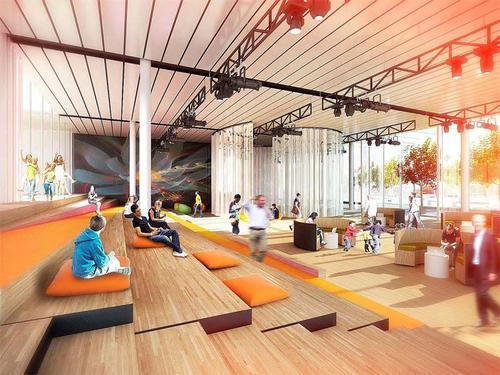Halifax Turns its Library into the City's Living Room
As libraries struggle to stay relevant against the instant allure of e-readers, Google, Netflix and online music streaming, Halifax is taking a big step in making them cool again.
The city is currently transforming its Halifax Central Public Library from a dusty book warehouse to a community hub for the digital age.
At almost triple the size of the original, the library will provide a 300-seat performance space to support the city's burgeoning arts scene; two cafes - including one overlooking the scenic harbour; gaming stations; e-book services, two music studios where people can bring instruments to the library and play, record, and burn a CD; a dedicated space for adult literacy; a First Nations reading circle; a boardroom for local entrepreneurs; and space for arts and culture based seminars.
No longer a place where people are shushed, this library is being billed as the "city's living room." Bruce Gorman, director of the Halifax Central Library and Regional Services, says you "don't have to be quiet" in this library. Being able to grab a latte, use the free wireless and on a nice evening sit out and watch sailboats in the harbour is "not what people expect to see when they are going into a public library. We are shifting people's thoughts about what public libraries are," said Gorman.
more
At a cost of $57 million, the Halifax Central Library also features a unique modern design with a cantilevered rectangular glass box on the top, suggesting a stack of books. It was designed by Danish architect Morten Schmidt's firm Schmidt Hammer Lassen and its Nova Scotia partners, Fowler, Bauld & Mitchell. According to Schmidt:
"A public library is probably as important as a church today or even more important than a city hall because it's the people building and everyone can come there."
According to The Globe and Mail, downtown libraries across the country are adapting to meet the needs of the local community in the information age:
At the Toronto Public Library, public-health nurses give vaccinations while other customers can self-publish books or print off a résumé. In Ottawa, librarians are teaching people how to Photoshop or make video clips; the Edmonton Public Library has an entire gaming section that allows visitors to play or make their own games.
Rather than shutting libraries down, many major Canadian cities are renovating them or building new ones. An architect was recently hired for Calgary's Central Library, which is expected to open in 2018 and the Toronto Public Library is completing a five-year, $34-million revitalization of its reference library.
"Modern libraries have changed. Communities need social spaces now and that's what this library provides," said Gorman.
Independent bookstores have adopted a similar strategy to stay relevant, as I've documented in my piece, The Fall (and Subsequent Rise) of the Independent Bookstore , Portland's Powell's Books is a hub of the downtown community:
At Powell's, anyone is welcome to walk around and browse the store until late at night. According to its website, 3,000 people walk into Powell's just to browse and drink coffee every day, while another 3,000 people actually buy something. When I was there, no salespeople were hassling me. I ended up in sections I wouldn't normally visit, buying books I would never have discovered in a chain bookstore or online. The best part of walking into these sections was eavesdropping and watching the people who visited them (like the Goth girls in the astrology section who were analysing their astrological compatibility with their boyfriends). Powell's Books also hosts events that bring the community together to celebrate artists and writers.
While reading may still be loved and enjoyed as a solitary experience, the way we purchase and obtain books - and the spaces we do so in - need not be.



